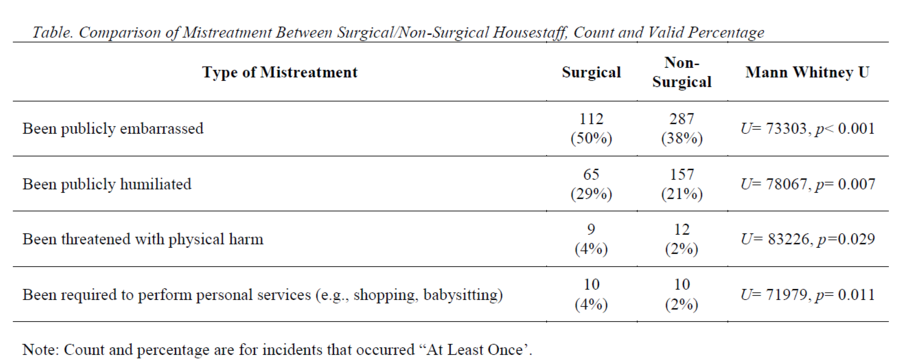Poster1-02: COMPARISON BETWEEN SURGICAL AND NON-SURGICAL HOUSESTAFF ON INCIDENTS OF MISTREATMENT
Jennifer Choi, MD, FACS1, Nital Appelbaum, PhD2, Sally Santen, MD, PhD2, Maya Hammoud, MD3, Paul M Wallach, MD1, Heather L Burrows, MD, PhD3, Stephanie Goldberg, MD, FACS4; 1Indiana University School of Medicine, 2VCU School of Medicine, 3University of Michigan Medical School, 4VCU Health
Background: While medical student mistreatment is monitored during undergraduate medical education, the incidents of mistreatment towards resident trainees often goes unreported. Experiencing mistreatment or witnessing the tolerance of unprofessional conduct in the learning environment contributes to trainee cynicism and burnout. The purpose of this study is to identify the types of mistreatment behaviors experienced by surgery residents across three institutions as compared to other trainees.
Methods: We recruited residents across three institutions to complete an electronic and/or paper-based survey that mirrors the AAMC mistreatment items on the Graduating Questionnaire for medical students. Frequencies and Mann-Whitney U group comparison tests were conducted through SPSS (Armonk, NY) to understand the types of incidents of mistreatment experienced by surgical and non-surgical housestaff.
Results: Of the 1096 residents who completed the survey, 225 identified as surgical and 759 were non-surgical. 40.4% (n=91) of surgical housestaff reported at least one incident of mistreatment compared to 34.9% (n=265) of non-surgical housestaff, excluding public em. Surgical housestaff reported a greater frequency of mistreatment compared to non-surgical housestaff for 4 out of 17 incidents types (Table). There was no statistically significant difference between surgical and non-surgical housestaff on reporting behavior; however, the majority of both surgical (n=107; 89.9%) and non-surgical (n=298; 85.9%) housestaff did not report incidents of mistreatment to others in their institution.
Conclusions: Compared to non-surgical housestaff, surgical trainees reported experiencing mistreatment more frequently for four specific incident types.

